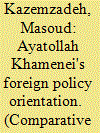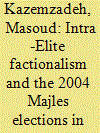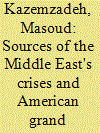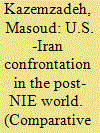|
|
|
Sort Order |
|
|
|
Items / Page
|
|
|
|
|
|
|
| Srl | Item |
| 1 |
ID:
124784


|
|
|
|
|
| Publication |
2013.
|
| Summary/Abstract |
This article analyzes the beliefs and patterns of behavior of Iran's Supreme Leader Ayatollah Ali Khamenei in regards to the nature of politics, political conflicts, and the role of agency in shaping events, strategy, and tactics. To do so, it discusses Khamenei's personal background, ideological formation, personality, and foreign policy statements.
|
|
|
|
|
|
|
|
|
|
|
|
|
|
|
|
| 2 |
ID:
156929


|
|
|
|
|
| Summary/Abstract |
This article analyzes how foreign policy is made in the Islamic Republic of Iran. To do so, it analyzes the role of various state institutions, factions, and individuals in the formulation and conduct of foreign policy. Actual powers of various institutions in Iran have evolved greatly since 1979. The history and causes of such institutional changes are discussed briefly. Iran is not a one-man dictatorship. Rather, it is ruled by an oligarchy comprised of fundamentalist Shia clerics and lay fundamentalists. The ruling elite is composed of competing factions such as hard-liners, expedients, and reformists, as well as sub-factions such as pragmatic hard-liners and ultra-hard-liners. The oligarchy is deeply divided on many issues, including on foreign policy. This article presents, in great detail, the views and policy proposals of the top members of the oligarchy regarding Iran's nuclear program, relations with the U.S., and Iran's regional policies. Finally, this article applies the findings of this research to the case of Iran's nuclear program. Evidence shows that Iran has had a clandestine nuclear weapons program. This article analyzes the ruling oligarchy's responses to the global reaction to Iran's nuclear program.
|
|
|
|
|
|
|
|
|
|
|
|
|
|
|
|
| 3 |
ID:
082005


|
|
|
| 4 |
ID:
164612


|
|
|
|
|
| Summary/Abstract |
This article argues that there are four major crises convulsing the Middle East. They are the Shia-Sunni conflict, rise of extremist militant fundamentalists, ethno-national demands, and pro-democracy movements. These have given rise to four clusters of actors. The article analyzes the ideological sources of Sunni and Shia fundamentalism, as well as Iran's grand strategy and American strategies and policies since 1979, trying to respond to these crises and challenges. It discusses the reasons for successes and failures of American policies and identifies lessons for future American policies toward the Middle East.
|
|
|
|
|
|
|
|
|
|
|
|
|
|
|
|
| 5 |
ID:
086636


|
|
|
|
|
| Publication |
2009.
|
| Summary/Abstract |
The United States, Israel, and several European allies have explicitly stated that they will not accept the possession of nuclear weapons by the Islamic fundamentalist regime ruling Iran. Iran has defied several UN Security Council resolutions and continued its uranium enrichment. On December 3, 2007, the U.S. released the November 2007 National Intelligence Estimate (NIE) on Iran. If the NIE assessment that Iran could develop nuclear weapons sometimes between 2010 and 2015 is correct, the new American president has twelve options available in dealing with Iran. This study analyzes potential consequences, shortcomings, costs, and benefits of each option.
|
|
|
|
|
|
|
|
|
|
|
|
|
|
|
|
|
|
|
|
|